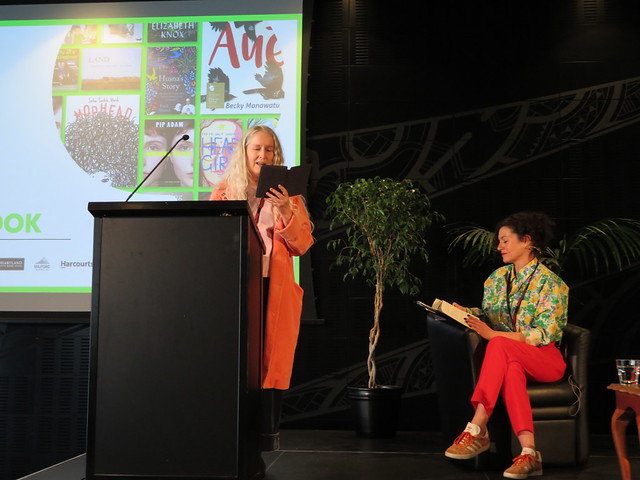Reporting back on this session with award-winning New Zealand author, Elizabeth Knox, is a challenge because the topic, her fantasy novel, The Absolute Book, has so much that happens in it, it's a struggle to talk about it without giving away major plot points. At a certain point in this session Noelle McCarthy and Knox herself abandoned any attempts at remaining spoiler free, simply encouraging everyone who hadn't already to read it afterwards.

Do I take the same approach or not? As someone who tells off her 6 year old for spoiling the end of picture books I haven't read yet, I'm going to lean towards "not" and see how it goes.
The session started with Knox reading a passage from near the beginning of the book, in which Taryn, the main character, and another character, known only as The Muleskinner, have a conversation, the consequences of which neither of them could possibly foresee. Everything in the rest of the book is lightly hinted at in this passage, Knox says, which probably explains why she chose to read it.
For Taryn, the story of The Absolute Book, is "... the story of her becoming herself".
Taryn is a person who has become broken through an act of violence and subsequent loss. Her journey through the book is one of figuring out, Knox says, "how to make herself useful" and she is someone who has "formed a carapace of suspicion" around herself. Of The Muleskinner, Knox says, "...he isn't quite alive in his own emotions" which perhaps explains part of his compulsion to act on the behalf of Taryn, who is suffering from a grief that she doesn't know what to do with.
McCarthy wonders, given that the book doesn't answer all the questions it poses, whether the book is still going somewhere?
"In my head, yeeesss," says Knox and she admits that she has in mind at least one vignette that amuses her that would involve a production of A midsummer night's dream starring real fairies.
At some point during the conversation between Knox and McCarthy I realise that the Sidhe, the fairy race that features in the book, is based on a real world mythical people (Irish Gaelic, it turns out) and that I've been pronouncing it in my head pretty much the way it's spelled, when in fact, it sounds more like "she". Whoops. But can I help it if my gaelic is a bit rusty/non-existent?
Of the way the story is constructed Knox says that she loves plot and makes sure that the reader is aware of some things before the characters are, other times the reader has to catch up, and in others still both the reader and the character find things out at the same time having a "simultaneous emotional experience".
With The Absolute Book she was trying to portray lots of competing interests amongst characters where everyone is defending something worth defending, trying to create the feeling for the reader of wanting to be on everyone's side (the exemplar for this she gave as Studio Ghibli film, Princess Mononoke.)
And look. There were a great many more things said and some of them are a bit spoilery, but here are a few other nuggets from Knox that I scribbled down in my notebook.
When asked about the contracts (in the context of those held amongst fairies, gods and demons):
Covenants are laws and you can change them and you can and should if they're about cannabis!
On the grand scale of the book in combination with the focus on a small set of characters:
I visualised it as an intimate epic.
On the book's attitude to libraries:
It's a love song to archives and public libraries.
Listen: Audio recording of this session
https://soundcloud.com/wordchristchurch/elizabeth-knox-the-absolute-book
More information
- See photos from the Elizabeth Knox: The Absolute Book session
- Read our interview with Elizabeth Knox - “…the book builds a thirst for its water”: Elizabeth Knox on The Absolute Book
- WORD Christchurch website (for the full programme and info about authors)
- Follow WORD Christchurch on Twitter and Facebook
- Read more WORD Christchurch Spring Festival 2020 coverage
- Find more titles by Elizabeth Knox



Add a comment to: WORD Christchurch: Elizabeth Knox’s ‘intimate epic’, The Absolute Book